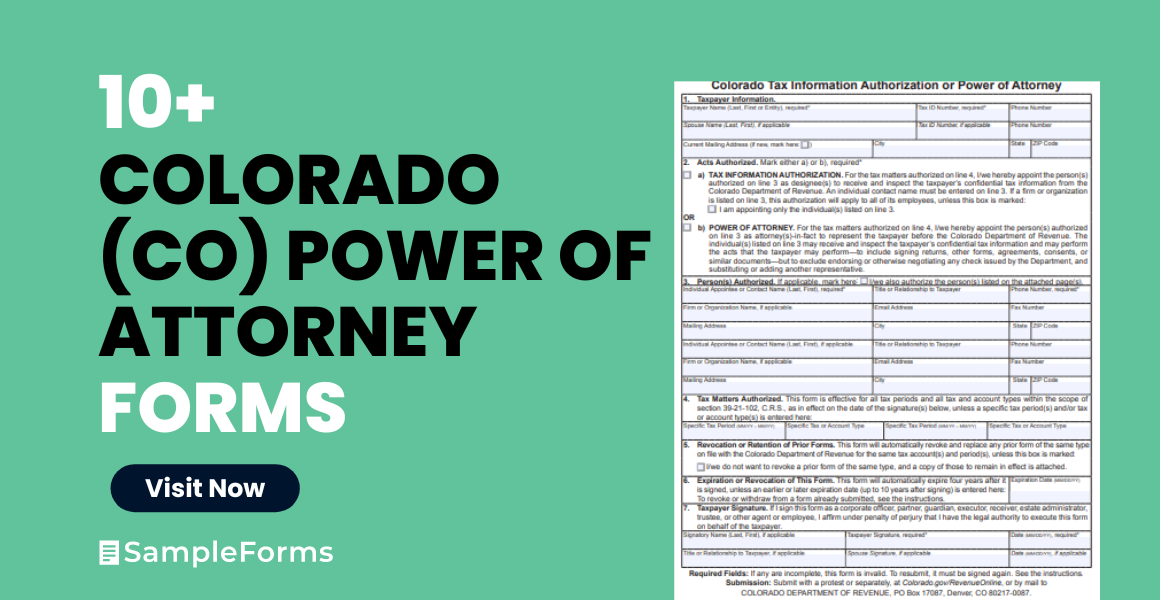Navigating the Colorado Power of Attorney (POA) process can be straightforward with the right guidance. Our detailed guide offers essential tips and insights on effectively using the Colorado POA form. Whether you’re managing financial affairs, healthcare decisions, or legal matters, understanding the nuances of Colorado’s POA regulations is crucial. This introduction provides a clear pathway to creating a legally sound and effective POA, tailored to your specific needs in the Centennial State.
What is the Colorado Power of Attorney Form?
The Colorado Power of Attorney (POA) Form is a legal document that allows an individual, known as the ‘Principal’, to appoint someone else, called the ‘Agent’ or ‘Attorney-in-Fact’, to make decisions on their behalf. This form is used in Colorado to grant the Agent authority to handle matters like finances, property, or healthcare decisions, especially if the Principal is unable to do so themselves due to various reasons like illness or absence.
What is the Best Sample Colorado Power of Attorney Form?
This sample Colorado Power of Attorney form is designed to grant authority to an appointed individual to make decisions on behalf of the principal. It’s important to tailor this form to your specific needs and ensure it complies with Colorado state law.
Colorado Power of Attorney Form
Section 1: Principal Information
- Full Name of Principal: ____________________________
- Address: ____________________________
- City, State, Zip: ____________________________
- Phone Number: ____________________________
- Email Address: ____________________________
Section 2: Agent Information
- Full Name of Agent: ____________________________
- Address: ____________________________
- City, State, Zip: ____________________________
- Phone Number: ____________________________
- Email Address: ____________________________
Section 3: Alternate Agent (Optional)
- Full Name of Alternate Agent: ____________________________
- Address: ____________________________
- City, State, Zip: ____________________________
- Phone Number: ____________________________
- Email Address: ____________________________
Section 4: Powers Granted
- Financial Decisions: [ ] Yes [ ] No
- Real Estate Transactions: [ ] Yes [ ] No
- Personal Property Transactions: [ ] Yes [ ] No
- Healthcare Decisions: [ ] Yes [ ] No
- Other (Specify): ____________________________
Section 5: Special Instructions
- Instructions: _______________________________________________________
Section 6: Duration
- Effective Date: _______________________
- Termination Date (if applicable): _______________________
- This Power of Attorney is:
- Durable (remains in effect if I become incapacitated)
- Non-Durable
Section 7: Signatures
- Principal’s Signature: _______________________ Date: _______________________
- Agent’s Signature: _______________________ Date: _______________________
- Alternate Agent’s Signature (if applicable): _______________________ Date: _______________________
Section 8: Acknowledgment
- Notary Public’s Acknowledgment: State of Colorado, County of ________________ On _______________________, before me, _______________________, Notary Public, personally appeared [Name of Principal], who proved to me on the basis of satisfactory evidence to be the person(s) whose name(s) is/are subscribed to the within instrument and acknowledged to me that he/she/they executed the same in his/her/their authorized capacity(ies), and that by his/her/their signature(s) on the instrument the person(s), or the entity upon behalf of which the person(s) acted, executed the instrument. I certify under PENALTY OF PERJURY under the laws of the State of Colorado that the foregoing paragraph is true and correct. Witness my hand and official seal: Signature _______________________ (Seal)
This sample Colorado Power of Attorney form is a foundational tool for authorizing another individual to make decisions on your behalf. It’s crucial to ensure all information is accurate and the form is notarized for legal validity. Consulting with a legal professional is recommended to customize this document to your specific needs.
1. Colorado Power of Attorney Form for Property
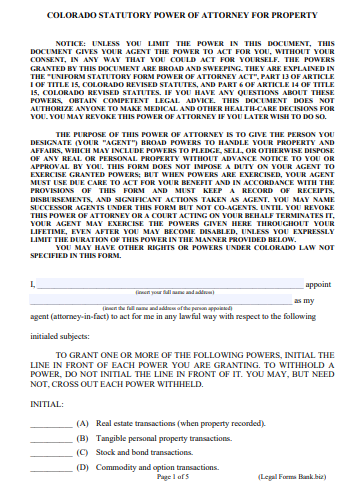
2. Colorado Power of Attorney Form for vehicle
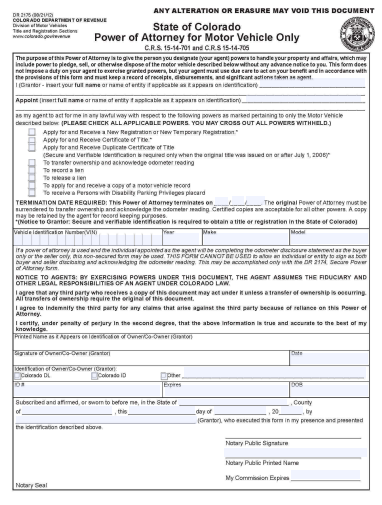
3. Colorado Durable Power of Attorney Form
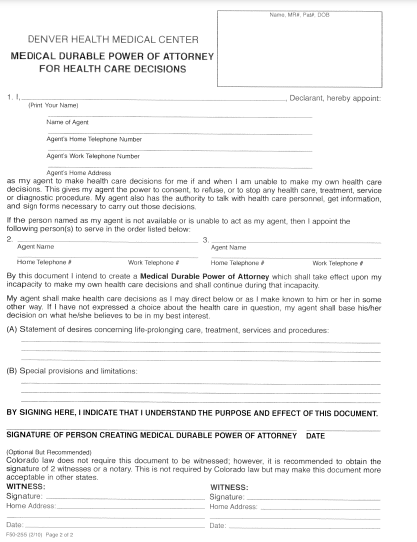
4. Colorado Printable Power of Attorney Form
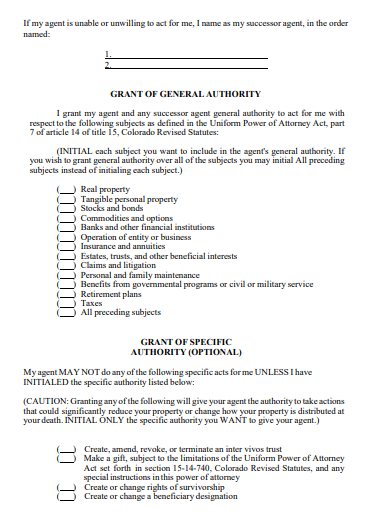
5. Colorado Standard Power of Attorney Form
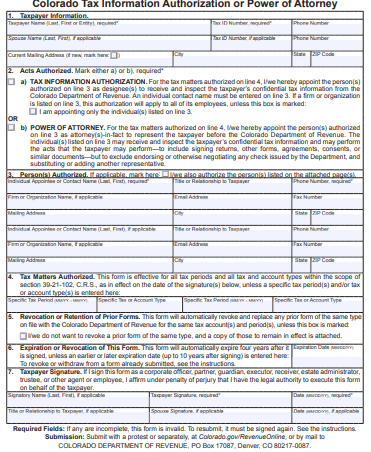
6. Colorado Sample Power of Attorney Form
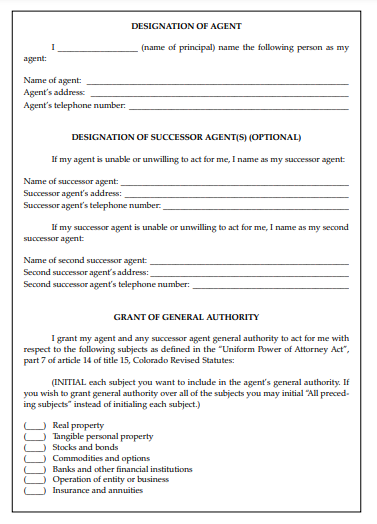
7. Colorado General Power of Attorney Form
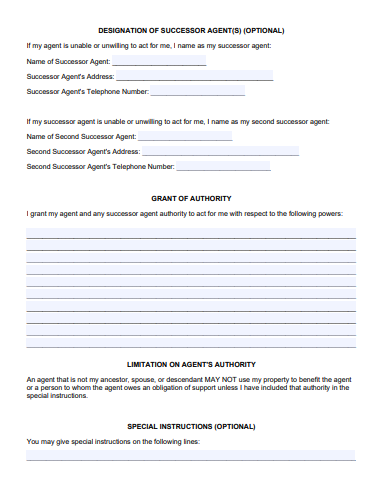
8. Colorado Medical Power of Attorney Form
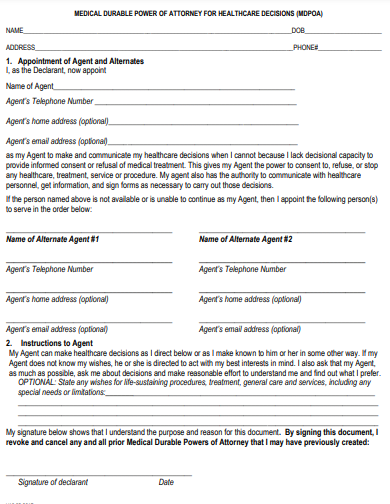
9. Colorado Power of Attorney Form for Property

10. Colorado Power of Attorney Form for vehicle

11. Colorado Durable Power of Attorney Form

How do I file for power of attorney in Colorado?
Filing for a Power of Attorney (POA) in Colorado involves a few key steps:
Choose the Type of POA:
- Decide whether you need a General, Durable, Limited, or Medical POA based on your specific needs.
Select Your Agent:
- Choose a trustworthy person to act as your agent (also known as an Attorney-in-Fact).
Draft the POA Document:
- Use a reliable template or seek legal assistance to draft the POA. Ensure it includes all necessary details like your name, your agent’s name, the powers granted, and any limitations.
Understand Legal Requirements:
- Colorado law requires that you are mentally competent when you sign the POA.
- The document must be signed voluntarily, without any coercion.
Sign the Document:
- Sign the POA in the presence of a notary public. Colorado law requires notarization for most POA documents.
- Some types of POA may also require witnesses.
Notarization:
- Have the document notarized. A notary public will verify your identity and ensure you understand the document and are signing it willingly.
Inform Your Agent:
- Give a copy of the POA to your agent and discuss your wishes and expectations.
Distribute Copies:
- Provide copies to relevant parties, such as financial institutions or healthcare providers, as necessary.
Store the Document Safely:
- Keep the original document in a secure place. Inform your agent and a trusted family member or friend where it is stored.
Regular Review and Update:
- Regularly review your POA and update it as needed to reflect any changes in your situation or preferences.
Remember, while you can draft and file a POA on your own, consulting with a legal professional can provide additional assurance that your document is properly drafted and legally sound, especially in more complex situations.
Does a Colorado power of attorney need to be notarized?
Yes, in Colorado, a Power of Attorney (POA) generally needs to be notarized to be legally valid. Notarization involves having the document signed in the presence of a notary public, who verifies the identity of the signer and ensures that they are signing the document willingly and without duress. This step adds a layer of legal authenticity and helps protect against fraud. For certain types of POA, like those involving real estate transactions, notarization is particularly important. Always ensure that your POA meets all the legal requirements set forth by Colorado law for it to be effective.
What is a statutory power of attorney form in Colorado?
A statutory power of attorney form in Colorado refers to a standard form that is provided by the state’s statutes for creating a Power of Attorney (POA). This form is designed to comply with Colorado laws and provides a template for individuals to grant someone else the authority to act on their behalf in financial and legal matters. The statutory form includes essential elements like the identification of the principal and agent, the powers granted, and any limitations or conditions. Using the statutory form can help ensure that the POA is legally valid and enforceable in Colorado. It’s a convenient option for those who prefer a standardized approach rather than creating a custom POA document.
What is a dr0145 power of attorney in Colorado?
The DR0145 form, also known as the Colorado Department of Revenue Power of Attorney,is a specific type of Power of Attorney form used in Colorado. This form grants an individual or entity the authority to represent another person in matters related to the Colorado Department of Revenue. It’s typically used for tax-related purposes, allowing the appointed agent to handle tasks such as filing taxes, obtaining confidential tax information, and representing the principal in tax matters before the Department of Revenue. The DR0145 form is essential for those who need assistance with their state tax affairs in Colorado and want to authorize a trusted representative to manage these matters on their behalf.
What is a durable power of attorney form in Colorado?
A Durable Power of Attorney form in Colorado is a legal document that allows an individual (the principal) to appoint someone else (the agent or attorney-in-fact) to make decisions on their behalf. The “durable” aspect means that the power of attorney remains in effect even if the principal becomes incapacitated or unable to make decisions for themselves. This form is commonly used for financial and healthcare decisions, ensuring that the agent can manage the principal’s affairs during times of illness or incapacity. It’s a crucial tool for estate planning and managing personal affairs, providing peace of mind that decisions will be made according to the principal’s wishes, even if they are unable to communicate them.
Does Colorado require witness for POA?
In Colorado, while notarization is typically required for a Power of Attorney (POA) to be legally valid, the presence of witnesses is not a state-mandated requirement for most POA documents. However, having witnesses can add an extra layer of validity, especially in situations where the POA might be contested or if there are concerns about the principal’s capacity at the time of signing. It’s always advisable to check the most current state laws or consult with a legal professional to ensure all legal requirements are met for your specific type of POA.
How to Prepare a Colorado Power of Attorney Form
Step 1: Determine the Type of POA Needed
- Decide if you need a General, Durable, Limited, or Medical Power of Attorney based on your specific requirements.
Step 2: Choose Your Agent
- Select a trustworthy individual to act as your agent (Attorney-in-Fact). Ensure they are willing and able to take on the responsibilities.
Step 3: Draft the POA Document
- Use a standard Colorado POA form or draft one with the help of legal resources. Ensure it includes all necessary details like your name, the agent’s name, and the powers granted.
Step 4: Specify Powers and Limitations
- Clearly outline the powers you are granting to your agent. Be specific about what they can and cannot do.
Step 5: Meet Legal Requirements
- Ensure you are mentally competent and understand the implications of signing the POA.
- The document must be signed voluntarily.
Step 6: Sign in the Presence of a Notary
- Sign the POA form in front of a notary public. Notarization is a legal requirement in Colorado for most POA documents.
Step 7: Inform Your Agent
- Discuss the POA with your agent, ensuring they understand their duties and your wishes.
Step 8: Distribute Copies
- Provide copies of the signed and notarized POA to your agent and any relevant institutions, such as banks or healthcare providers.
Step 9: Store the Document Safely
- Keep the original POA in a secure location and inform your agent and a trusted individual about its whereabouts.
Step 10: Regular Review and Update
- Regularly review and update your POA as needed to reflect any changes in your situation or preferences.
Creating a Power of Attorney in Colorado is a straightforward process that ensures your affairs are managed according to your wishes. While you can complete this process on your own, consulting with a legal professional is advisable for complex situations or for additional guidance.
Tips for Using Effective Colorado Power of Attorney Form
1. Choose the Right Agent
- Select someone trustworthy, reliable, and capable of handling responsibilities effectively.
2. Be Specific About Powers Granted
- Clearly define the scope of authority you are giving to your agent to avoid ambiguity.
3. Consider a Durable POA
- Opt for a Durable Power of Attorney if you want it to remain effective even if you become incapacitated.
4. Regularly Update Your POA
- Review and update your POA periodically to reflect any changes in your circumstances or wishes.
5. Understand the Legal Requirements
- Ensure your POA complies with Colorado state laws, including requirements for notarization.
6. Communicate with Your Agent
- Discuss your expectations and instructions with your agent to ensure they understand their role.
7. Keep the Document Accessible
- Store your POA in a safe but accessible place and inform your agent and family members where it is kept.
8. Consult with Professionals
- Seek advice from legal or financial professionals if you have complex needs or questions.
9. Avoid Coercion
- Ensure the POA is signed voluntarily and without any undue influence.
10. Consider Alternate Agents
- Appoint an alternate agent in case your primary agent is unable or unwilling to serve.
An effective Colorado Power of Attorney requires careful planning and clear communication. By following these tips, you can ensure that your POA serves its intended purpose and provides peace of mind for both you and your agent.
Can I Change Powers of Attorney in the Future?
Yes, you can change or revoke your Power of Attorney at any time, as long as you are mentally competent to make such decisions.
Can Multiple People Share Powers of Attorney for Me?
Yes, you can appoint multiple agents in your Power of Attorney to share responsibilities, either jointly or separately.
What Are My Options if My Powers of Attorney Are Abused?
If your Power of Attorney is abused, you can revoke it, seek legal action against the agent, or report the abuse to local authorities.
What Are the Limitations of a Power of Attorney?
A Power of Attorney cannot grant an agent the ability to change your will, vote in your stead, or perform duties after your death.
In summary, creating a Colorado Power of Attorney form is a vital step in managing your affairs. This guide and tips provide a clear roadmap for drafting an effective POA, tailored to your specific needs. Remember, regular updates and clear communication with your agent are key to ensuring that your POA remains an effective tool for safeguarding your interests in Colorado.
Related Posts
-
10+ Free New Hampshire (NH) Power of Attorney Form Download – How to Create Guide, Tips
-
10+ Free Nevada (NV) Power of Attorney Form Download – How to Create Guide, Tips
-
10+ Free Nebraska (NE) Power of Attorney Form Download – How to Create Guide, Tips
-
10+ Free Montana (MT) Power of Attorney Form Download – How to Create Guide, Tips
-
10+ Free Missouri (MO) Power of Attorney Form Download – How to Create Guide, Tips
-
10+ Free Minnesota (MN) Power of Attorney Form Download – How to Create Guide, Tips
-
10+ Free Mississippi (MS) Power of Attorney Form Download – How to Create Guide, Tips
-
10+ Free Massachusetts (MA) Power of Attorney Form Download – How to Create Guide, Tips
-
10+ Free Maryland (MD) Power of Attorney Form Download – How to Create Guide, Tips
-
10+ Free Maine (ME) Power of Attorney Form Download – How to Create Guide, Tips
-
10+ Free Louisiana (LA) Power of Attorney Form Download – How to Create Guide, Tips
-
10+ Free Kentucky (KY) Power of Attorney Form Download – How to Create Guide, Tips
-
10+ Free Kansas (KS) Power of Attorney Form Download – How to Create Guide, Tips
-
10+ Free Iowa (IA) Power of Attorney Form Download – How to Create Guide, Tips
-
10+ Free Indiana (IN) Power of Attorney Form Download – How to Create Guide, Tips
